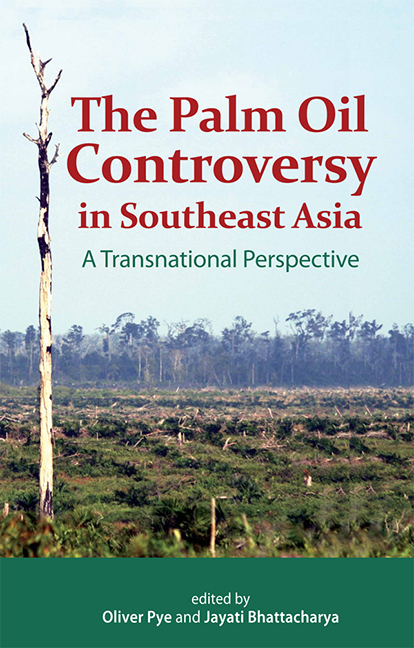Book contents
- Frontmatter
- Contents
- Foreword
- Preface
- Contributors
- Abbreviations
- 1 Introduction
- 2 Malaysian Corporations as Strategic Players in Southeast Asia's Palm Oil Industry
- 3 The Political Ecology of the Indonesian Palm Oil Industry
- 4 Evolutionary Change in the Oil Palm Plantation Sector in Riau province, Sumatra
- 5 Contradictions of Palm Oil Promotion in the Philippines
- 6 The Political Economy of Migration and Flexible Labour Regimes: The Case of the Oil Palm Industry in Malaysia
- 7 Migration and Moral Panic: The Case of Oil Palm in Sabah, East Malaysia
- 8 Reconciling Development, Conservation, and Social Justice in West Kalimantan
- 9 An Analysis of Transnational Environmental Campaigning around Palm Oil
- 10 EU Biofuel Policies and their Implications for Southeast Asia
- 11 Leveraging Product and Capital Flows to Promote Sustainability in the Palm Oil Industry
- 12 Free, Prior, and Informed Consent? Indigenous Peoples and the Palm Oil Boom in Indonesia
- Index
- Plate section
5 - Contradictions of Palm Oil Promotion in the Philippines
Published online by Cambridge University Press: 21 October 2015
- Frontmatter
- Contents
- Foreword
- Preface
- Contributors
- Abbreviations
- 1 Introduction
- 2 Malaysian Corporations as Strategic Players in Southeast Asia's Palm Oil Industry
- 3 The Political Ecology of the Indonesian Palm Oil Industry
- 4 Evolutionary Change in the Oil Palm Plantation Sector in Riau province, Sumatra
- 5 Contradictions of Palm Oil Promotion in the Philippines
- 6 The Political Economy of Migration and Flexible Labour Regimes: The Case of the Oil Palm Industry in Malaysia
- 7 Migration and Moral Panic: The Case of Oil Palm in Sabah, East Malaysia
- 8 Reconciling Development, Conservation, and Social Justice in West Kalimantan
- 9 An Analysis of Transnational Environmental Campaigning around Palm Oil
- 10 EU Biofuel Policies and their Implications for Southeast Asia
- 11 Leveraging Product and Capital Flows to Promote Sustainability in the Palm Oil Industry
- 12 Free, Prior, and Informed Consent? Indigenous Peoples and the Palm Oil Boom in Indonesia
- Index
- Plate section
Summary
The Philippines has been a latecomer to the palm oil business. Whilst Malaysia and Indonesia are expanding the area devoted to palm oil by millions of hectares, the extent of Filipino palm oil plantations remains below one hundred thousand hectares. However, in recent years the government has adopted a pro-palm oil policy, hoping to emulate the economic success of its neighbours by following the palm oil development path. Palm oil expansion is taking place particularly in Mindanao, a large island in the South of the Philippines that has been characterized by continued conflicts between government and Moro secessionist groups. Given the distinct character of Mindanao as a hotbed of conflict and the continuing poverty and underdevelopment in the region, the Philippine Government has defined palm oil as a vehicle to promote peace and development in the region.
This chapter looks at the palm oil promotion programme of the Philippine Government and at the key actors involved. It argues that transnational investment from Malaysia is a key factor in current expansion and that palm oil investment has received a new boost through the biofuels policies of the government. It then takes a look at the reality of palm oil development on the ground. In contrast to the win-win development scenario portrayed by the government and investors, rural communities often experience problems of land grabbing and environmental destruction and smallholders are often given less support than the large corporations. Therefore, despite massive enticement among the locals, some rural poor communities have resisted efforts to promote palm oil in the region. The chapter ends with some reflections on the different reactions and strategies of civil society towards the issue of palm oil and the new challenges posed by the biofuels agenda.
GOVERNMENT PROMOTION OF OIL PALM IN THE PHILIPPINES
The Philippines has been a net importer of palm oil since the early 1990s. Only about 30 per cent of palm oil consumption is met by domestic production, the rest being imported from Malaysia, averaging an annual cost of US$20 million to as high as US$100 million of oil palm products. Imports of crude palm oil have increased from 2.7 billion tonnes in 1985 to 67 billion tonnes in 2000 (Derequito 2005a).
- Type
- Chapter
- Information
- The Palm Oil Controversy in Southeast AsiaA Transnational Perspective, pp. 97 - 119Publisher: ISEAS–Yusof Ishak InstitutePrint publication year: 2012



